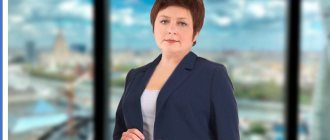ST 18 of the Criminal Code of the Russian Federation.
1. Recidivism of crimes is the commission of an intentional crime by a person who has a criminal record for a previously committed intentional crime.
2. Recidivism of crimes is considered dangerous: a) when a person commits a serious crime for which he is sentenced to actual imprisonment, if earlier this person was sentenced to imprisonment two or more times for an intentional crime of moderate gravity; b) when a person commits a serious crime, if he was previously convicted of a serious or especially serious crime to actual imprisonment.
3. Recidivism of crimes is recognized as especially dangerous: a) when a person commits a serious crime for which he is sentenced to real imprisonment, if previously this person was twice sentenced for a serious crime to real imprisonment; b) when a person commits a particularly serious crime, if he has previously been convicted of a serious crime twice or has previously been convicted of a particularly serious crime.
4. When recognizing a recidivism of crimes, the following are not taken into account: a) convictions for intentional crimes of minor gravity; b) convictions for crimes committed by a person under the age of eighteen; c) convictions for crimes for which the conviction was deemed suspended or for which a deferment of execution of the sentence was granted, if the conditional conviction or deferment of execution of the sentence was not canceled and the person was not sent to serve the sentence in prison, as well as convictions expunged or expunged in accordance with the procedure, established by Article 86 of this Code.
5. Recidivism of crimes entails a more severe punishment on the basis and within the limits provided for by this Code, as well as other consequences provided for by the legislation of the Russian Federation.
Commentary to Art. 18 Criminal Code
1. Recidivism is the most dangerous form of multiple crimes, since the second criminal act is committed after the fact of conviction for the first crime.
2. According to Part 1 and Part 4 of the article, recidivism (simple relapse) is characterized by the following features: a) the commission of two or more intentional crimes; b) the presence of an unexpunged or outstanding conviction for the commission by an adult of one of these intentional crimes of moderate gravity or grave or especially grave, subject to his conviction to real punishment without a suspension of execution of the sentence.
3. Parts 2 and 3 of the article provide for two more types of recidivism: dangerous and especially dangerous.
4. Recidivism of crimes entails a more severe punishment on the basis and within the limits provided for by the sanctions of the articles of the Special Part of the Criminal Code. The law provides for special conditions for imposing punishment for repeat crimes (see commentary to Article 68 of the Criminal Code). Other consequences of relapse include the fact that it acts as an aggravating circumstance (clause “a”, part 1, article 63 of the Criminal Code); influences the appointment of a type of correctional institution for those sentenced to imprisonment (Article 58 of the Criminal Code); is the basis for the court to establish administrative supervision as a special crime prevention measure and individual prevention in relation to a person released from prison (according to the Federal Law of April 6, 2011 N 64-FZ “On administrative supervision of persons released from prison ").
The concept and types of recidivism of crimes
Article 18 of the Criminal Code of the Russian Federation defines the concept of recidivism - this is the commission of an intentional crime by a person who has a criminal record for a previously committed intentional crime.
In this case, it is necessary to clarify what constitutes a “criminal record.” In criminal law, a criminal record is a special legal status of a person, created by the fact of his conviction for committing a crime to any punishment and characterized by certain social and criminal legal consequences unfavorable for the given subject. A criminal record is valid from the day a court conviction comes into force and continues until the criminal record is expunged or removed.
In addition to the “ordinary” recidivism, the current criminal legislation separately distinguishes the types of dangerous and especially dangerous recidivism.
Thus, recidivism of crimes is considered dangerous:
- when a person commits a serious crime for which he is sentenced to real imprisonment, if earlier this person was sentenced to imprisonment two or more times for an intentional crime of average gravity;
- when a person commits a serious crime, if he was previously convicted of a serious or especially serious crime to actual imprisonment.
The third, most qualified type of recidivism is especially dangerous recidivism of crimes:
- when a person commits a serious crime for which he is sentenced to real imprisonment, if previously this person was twice sentenced for a serious crime to real imprisonment;
- when a person commits a particularly serious crime, if he was previously convicted of a serious crime twice or was previously convicted of a particularly serious crime.
Recidivism of crimes entails a more severe punishment - the most severe type of punishment is determined, the type of correctional institution is tightened, and in case of dangerous and especially dangerous recidivism, conditional sentencing is not applied.
However, not all cases of having a criminal record at the time of committing a new crime constitute a recidivism. In particular, when recognizing recidivism of crimes, convictions for intentional crimes of minor gravity, convictions for crimes committed by a person under the age of eighteen, convictions for crimes for which the conviction was recognized as suspended or for which a deferment of execution of the sentence was granted, if the conviction was suspended or suspended the execution of the sentence was not canceled and the person was not sent to serve the sentence in places of deprivation of liberty, as well as the convictions were withdrawn or expunged.
The article material is taken from open sources
Do you have any questions for your lawyer on this topic?
Ask them right now here, or call us by phone in Moscow +7 (499) 288-34-32 or in Samara +7 (846) 212-99-71 (24 hours a day), or come to our office for a consultation (by pre-registration)!
Second commentary to Art. 18 of the Criminal Code of the Russian Federation
1. Recidivism as a type of plurality is characterized by the fact that a person convicted of an intentional crime, before expunging or removing the criminal record, again commits an intentional crime.
Relapse has the following signs:
- commission of two or more intentional crimes by a person;
- having a criminal record for a previous crime.
2. Recidivism characterizes the personality of the criminal, indicates his relatively stable antisocial attitudes, and therefore a greater social danger.
3. According to the commented article, the legislator divides recidivism into three types: simple, dangerous and especially dangerous. The criteria for such differentiation are the categories of crimes committed, the number of convictions and the type of punishment.
4. In part 4 of Art. 18 lists convictions that do not constitute a recidivism.
5. The legal consequences of relapse are as follows:
- it influences the court’s choice of the type, term and amount of punishment;
- paragraph “a”, part 1, art. 61 of the Criminal Code classifies relapse as aggravating circumstances;
- in case of relapse, a special procedure for assigning punishment is provided (Article 68 of the Criminal Code);
— taken into account when determining the type of correctional institution for serving imprisonment (Article 58 of the Criminal Code);
- can act as a special qualifying feature in crimes against sexual freedom and sexual integrity;
- in some cases is a condition for establishing administrative supervision.
Reasons for repeat crime
Repeated commission of a crime is called relapse. When considering the causes of recidivism, one should take into account the causes of the increase in crime in general, because they are influenced by the same factors. Thus, if you eliminate the common reasons that provoke crimes, you can get rid of repeated crimes. However, if we consider the reasons for the immediate re-commitment of a crime, as a separate object, in order to subsequently take preventive measures, then first of all this concerns shortcomings in the work of correctional institutions, which often contribute to the growth of recidivism, in this case the help of a lawyer will be needed. The main disadvantage of the penitentiary system is that individual criminals are not subject to appropriate influence, which is why all correctional work with prisoners as a whole suffers. In addition, correctional officers often have little knowledge of the psychology of certain criminals and cannot always understand the reasons that prompted the convicted person to commit a crime. The lack of experience and professional skills of individual approach among correctional officers also negatively affects the increase in repeat crimes. However, recently there has been a tendency to improve in this direction, as some correctional institutions employ professional specialists, namely, psychologists and psychiatrists. But until this has become widespread, the methods developed by psychologists are rarely used in practice. Another weakness of correctional institutions is that their staff are unable to listen to prisoners. In addition, the large range of responsibilities of penitentiary system workers does not leave them time to listen to frank conversations of convicts. However, most prisoners have a need to speak out in order to alleviate their mental suffering and feel understood. Often, once imprisoned, they feel like victims of a soulless system, personified by investigators, judges, prosecutors and, of course, prison administration, who documented the very fact of the crime and imposed punishment without seeing the person behind it, his problems and mistakes. During a consultation with a lawyer, you can learn that repeated commission of a crime is called recidivism and it must be eliminated. In addition, the peculiarities of the conditions in which correctional institutions are located increase people's anxiety, creating constant tension both among the prisoners themselves and between prisoners and the administration. Sometimes such tension develops into acute conflict situations. The help of a lawyer will help in such problems and prevent you from re-committing a crime. The reasons for committing repeated crimes often lie in the difficulties of socialization after the punishment ends and the convicted person is released. The main factors are the lack of housing and difficulties in finding a job. Usually these problems are accompanied by the need for medical attention. Especially if elderly or disabled people find themselves in a difficult situation. Therefore, experts emphasize that the first 3 years of leaving prison become critical. As a rule, it is at this time that repeat crimes are most often committed. At the same time, administrative supervision over those released from prison was weakened. Separately, it is necessary to highlight persons whose court decision on punishment is not related to imprisonment. Recently, the rate of repeat offending has increased among this category of criminals. This is primarily due to the fact that most criminals, having received a sentence that is served outside of prison, perceive it as forgiveness. In addition, such convicts often fall out of sight of the police and no educational work is carried out with them. The reasons for committing repeated crimes can be found out by consulting a lawyer. Also among the causes of repeated crimes include shortcomings in the investigation, for example, when criminals are not brought to justice for their crimes, remaining unpunished, which causes an increase in recidivism. Another factor influencing re-offending is drug addiction and alcoholism.
Punishment for repeat crime
Article 40 of the Criminal Code of the Russian Federation regulates the procedure for punishment in the event of a repeated crime. Since a repeated crime is the most dangerous form of crime, if it is committed by the same person, it means that his actions are not random, and that this criminal has formed antisocial habits of a criminal nature. That is why, at the legislative level, recidivism of crimes is defined as a circumstance characterizing a high danger to society. Repeated commission of a crime is determined by a crime that is committed under aggravating circumstances, and accordingly, liability for this crime will be more severe. Based on paragraph 1 of Article 39 of the Criminal Code of the Russian Federation, a repeat crime is a circumstance that aggravates liability. In some cases, a repeat crime may become a circumstance that can stop the running of the statute of limitations, i.e. The statute of limitations will begin from the time the last crime was committed.
Considering the increased public danger from committing repeated crimes, recognizing a convicted person as a repeat offender will entail the most serious legal consequences. The help of a lawyer will help you avoid committing a crime again.
Attention! Due to recent changes in legislation, the legal information in this article may be out of date! Our lawyer can advise you free of charge Ask a question to a lawyer






